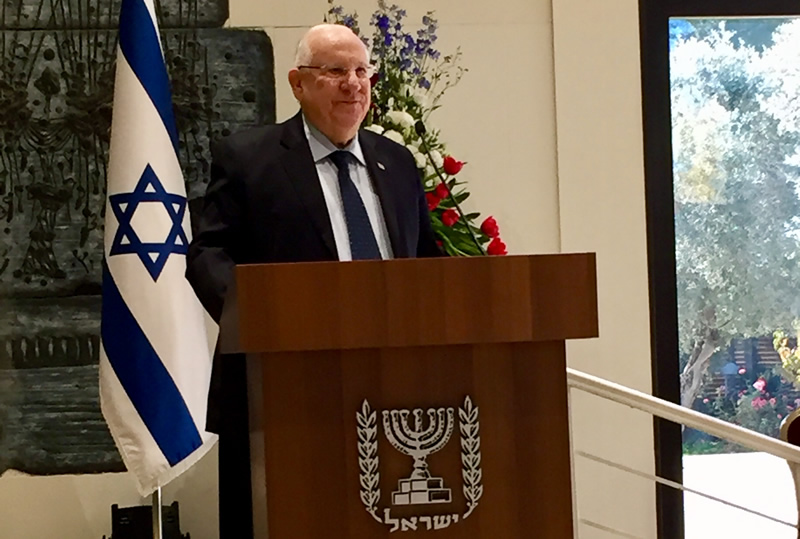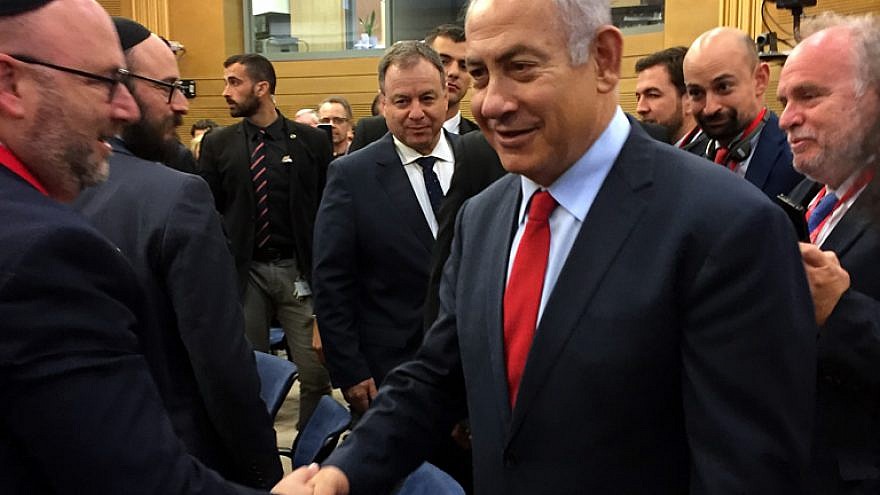“From our earliest days and all throughout history, our words have defined who we are,” President Reuven Rivlin said from the podium at the President’s Residence to a crowd of more than 150 Jewish journalists on the last day of the Nov. 25-28 Jewish Media Summit.
And perhaps to throw a bone to the group, which represented locales from around the world, he added that in contemporary times, some of the Jewish people’s greatest leaders, like Theodor Herzl, Nachum Sokolow and Ze’ev Jabotinsky, were writers.
But according to Alan Smason, editor of the Crescent City Jewish News, the conference presented only one side of the truth: the Israeli government’s side.
“Most of the questions were selected prior to the conference, and the GPO [Government Press Office] knew the answers that were going to be given,” he said. “There are questions that needed to be asked and answered, and often were not.”
The summit was organized by the Government Press Office with the Diaspora Affairs, Foreign Affairs, and Jerusalem and Heritage ministries. Journalist came from 30 countries, including France, Hungary, South Africa and several Latin American countries.
Though journalists seemed to enjoy themselves—plentiful were both the food and food for thought—the conference got off to a rocky start.
There were grumbles at the opening event held at Zedekiah’s Cave in Jerusalem the first night when Israeli Prime Minister Benjamin Netanyahu canceled his live address to the group due to an unannounced historic first visit to Israel by the president of Chad. That could be considered understandable, especially by a room full of reporters, though his replacement video address never aired.
U.S. Ambassador to Israel David Friedman likewise was absent at the opening ceremony because of inclement weather—snow in the United States.

‘More access to top-level officials’
It was a blow to the Jewish media, who were in Israel a month after the government hosted nearly 200 Christian journalists from around the world for the second annual Christian Media Summit, which was opened by both Netanyahu and Friedman.
Fewer top government and Knesset officials addressed the Jewish summit than the Christian one. A question-and-answer session with opposition leader Tzipi Livni (Zionist Union) was cancelled, the group ran out of time to meet with Knesset Speaker Yuli Edelstein (Likud), and Diaspora Affairs Minister Naftali Bennett (Bayit Hayehudi) was a no-show.
“I felt like having made the journey, we should have been given more access to more top-level officials,” said Smason.
Ultimately, Netanyahu did address the group on the last day in an impromptu meeting that Times of Israel’s Amanda Borschel-Dan called a “game of softball” in her analysis of the session since most questions asked lacked substance, and when they did, he managed to evade them.
For instance, when Smason asked Netanyahu about the challenging state of Israeli-Diaspora relations, the prime minister turned his question into a discussion about the Diaspora’s “disturbing demographic trends—assimilation chipping away at our numbers.”
Netanyahu schooled the crowd: There were 12 million Jews at the end of the Holocaust and 18 million before that tragic event. Today, the Jewish people number around 14 million, and most of them will soon be living in Israel.
“Seventy years ago, there were only 600,000 Jews in Israel,” he said. “Today we have almost 7 million Jews here, and we are going to cross the midway point where the majority of Jews are going to live in the land of Israel, while the Diaspora is steadily shrinking in numbers.”
“The bad part is the shrinking Diaspora,” he continued, “and really just the disappearance of Jewish identity. That is what concerns me.”
‘The Diaspora and Israel are in it together’
While the crowd cheered for the prime minister and even jostled him as he exited the hall in the same rush in which he entered, Rivlin offered more time and kinder words.
“Israel is the home of the Jewish people: Where you are and whenever you decide to come to us, you are welcome,” he said with a big smile.
The president referenced his famous notion that there is no longer a clear Zionist majority in Israel, but that society is made up of four sectors or tribes: secular, national religious, haredim and Arabs. He reminded the journalists that they are part of Israel’s “fifth tribe.”
“The world is a small village, and the Jewish people is a fifth tribe,” he said. “Like it or not, the Diaspora and Israel are all in it together with the same goals, same needs.”
The summit was packed and intense, said David Ben Hooren, founder and publisher of The Jewish Voice of New York.
“We discussed many issues,” he said, noting he got the message: “We should not present Israel only from the perspective of the conflict. Otherwise, you are making a big mistake.”
Ben Hooren said the conference tried to show young reporters “how beautiful Israel is.”
Gabriel Boxer, popular in the blogosphere as “Kosher Guru,” agreed. He said the first full day of the conference that was spent at Jerusalem’s Mishkenot Sha’ananim conference center in lectures and roundtables run by Israeli journalists and scholars proved “fascinating from a journalistic point of view. It showed me how you can properly or improperly portray the same exact situation or how you can look at one story in some many ways.
“My big takeaway is that we have a responsibility to our readers, listeners, followers to be honest and put our views on the side,” he said.
Educating the next generation of writers on Israel
Of course, at the Jewish summit, it was hard to define the Jewish press. Unlike the Christian summit, which, according to Dean Bye—founder and executive director of Canada’s Return Ministries, who attended both summits—“drew an incredible array of top Christian media. At the Jewish Media Summit, there were probably more social media journalists.”
Ben Hooren described many of the younger attendees as “would-be-journalists who came along for the ride,” and noted that many key Jewish publications were absent, including the Brooklyn, N.Y.-based Jewish Press, Hamodia and even top-level representation from the Jewish Journal of Los Angeles.
But Smason said this was both intentional and smart.
“They are the writers of the future,” he said. “The state of Jewish journalists is such that many of the time-honored institutions we have come to know and love will not be here in 10 or 20 years, and these innovators and influences will be using different platforms to share the news.
“It’s a dangerous situation with the blogosphere that these young people not be educated about Israel. It is just as easy to promote Israel as it is to tear it down. The pendulum can swing both ways.”
The reality, of course, is that the pendulum in many ways already has.
Bye said it was obvious to him that a key difference between the summits were the “pretty heated exchanges” that took place during the Jewish Media Summit and were absent from the Christian event.
“I could see the inner struggles and the gap between those who are Israeli and those still living the Diaspora,” he said.
Bye said he felt that many of the speakers were trying to “make a case for support” from the Jewish reporters and trying to help these writers understand Israel from more perspectives.
“I got the sense that the Jewish media is a harder sell than the Christian media,” he said. “Many of the speakers at the Jewish Media Summit realized there is a rift or gap that has been developing between Israel and the Diaspora. Some seemed apologetic. Others felt a need to explain where they are coming from. And they went to great lengths to try to help their colleagues or brethren really know what is happening.”
Bye said he would have hoped to find Jewish journalists as excited that Israel is a nation as his Christian colleagues. Rather, he said, “There was no doubt that some of the people at the summit are keeping Israel at greater accountability.”
Many would say that is understandable given the vested interest Jews have for Israel, no matter where they may reside permanently.
Bye explained that for Christians there is “such an excitement for the fact that Israel is Israel, and no matter who would be speaking to us, it was like, ‘Wow!’ ”
But Boxer said the Jewish press should have known what they were coming to, and that most of the travelers embraced it. With tracks focused on Israeli innovation, art and culture, and coexistence, he said even the nontraditional press could be engaged.
“We were guests of the GPO and in Israel as their guests,” said Boxer. “Their prerogative is to make Israel look good and show Israel in a certain light. I think they put together an amazing program.”


























